

The Value of IT Automation, featuring research from Gartner. IT automation: The lynchpin for organizational transformation in a DevOps world At Puppet Labs, we’ve been investigating the state of DevOps practices for several years and helping organizations achieve higher levels of efficiency.
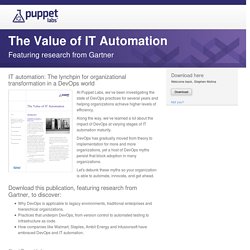
Along the way, we’ve learned a lot about the impact of DevOps at varying stages of IT automation maturity. DevOps has gradually moved from theory to implementation for more and more organizations, yet a host of DevOps myths persist that block adoption in many organizations. Let's debunk these myths so your organization is able to automate, innovate, and get ahead. DevOps Wiki. Set of software development practices DevOps is a set of practices that combines software development (Dev) and information-technology operations (Ops) which aims to shorten the systems development life cycle and provide continuous delivery with high software quality.[1][2] Definition[edit] Academics and practitioners have not developed a unique definition for the term "DevOps.
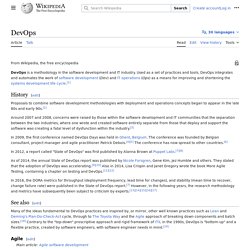
"[a][b][c][d] From an academic perspective, Len Bass, Ingo Weber, and Liming Zhu — three computer science researchers from the CSIRO and the Software Engineering Institute — suggested defining DevOps as "a set of practices intended to reduce the time between committing a change to a system and the change being placed into normal production, while ensuring high quality".[6] The term DevOps, however, has been used in multiple contexts.[7][unreliable source?]
History[edit] In 2009, the first conference named devopsdays was held in Ghent, Belgium. Toolchains[edit] Relationship to other approaches[edit] Agile[edit] WinOps[edit] What to Expect When Transitioning to DevOps. So you’ve heard about all the great things that DevOps has to offer, and are excited to jump in and start embracing DevOps practices at your organization.
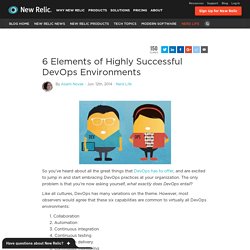
The only problem is that you’re now asking yourself, what exactly does DevOps entail? Like all cultures, DevOps has many variations on the theme. However, most observers would agree that these six capabilities are common to virtually all DevOps environments: 1. Collaboration 2. Below we offer a brief description of each element, adapted from our latest eBook, “Navigating DevOps.” 1. Successful DevOps requires business, development, QA, and operations organizations to coordinate and play significant roles at different phases of the application lifecycle. 2.
The only caveat: Because DevOps tools are so amazingly awesome, there’s a tendency to see DevOps as just a collection of tools. 3. 4. Continuous testing is not just a QA function, in fact, it starts in the development environment. 5. Exactly what gets released varies as well. 6. DevOps : A Longer Story Than I Thought! Continuous improvement is my definition of being Agile.
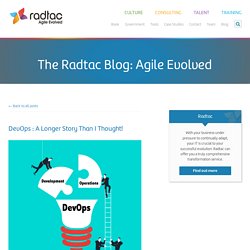
‘But wait’, I hear you cry, surely it can’t be that simple… Well of course it is, so where do you start? In the Agile arena, we prescribe frameworks to manage our workflow, behaviours to influence our culture and technical practices to improve product quality. Not surprisingly then, my personal experience of coaching and training over the last couple of years has revealed this ‘thinking split’ in all its glory in every organisation I have had the pleasure of being invited into.
Inherently we tend to divide our organisations into logical steps. I'm sure those well versed in human psychology and literacy can describe it far better than I. What this ultimately means is that to produce an idea we create communication gaps and handoffs as a mode of working. So to build software things better, we start dipping back into the thinking that software is just like producing a bike, the same bike, over and over again.
How Docker Fits Into The DevOps Ecosystem - The New Stack. It’s hard for me not to write about the Docker container technology when there are so many developments to follow.
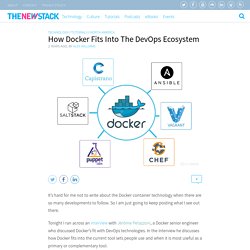
So I am just going to keep posting what I see out there. Tonight I ran across an interview with Jérôme Petazzoni, a Docker senior engineer who discussed Docker’s fit with DevOps technologies. In the interview he discusses how Docker fits into the current tool sets people use and when it is most useful as a primary or complementary tool. There is not a deep knowledge abut how to use Docker. How does it fit with Chef, Puppet, Salt, or Ansible? Instead, Docker, for example, abstracts the complexity of configuration management like Puppet. But you no longer have to make that investment super early and face that steep learning curve. The need for ease of use and simplicity has become a cry I have heard more often when talking to developers and operations people at conferences about configuration management technologies. Docker makes the new stack becomes more tangible.